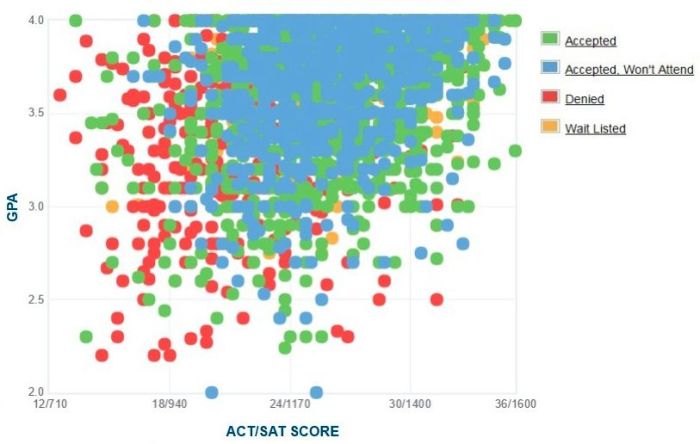Embark on a journey through the intricacies of Baylor University’s GPA requirement, a crucial aspect of the admission process. Discover the significance of GPA, explore strategies for academic excellence, and delve into alternative pathways to admission. Whether you’re an aspiring undergraduate or a transfer student, this guide provides an immersive and comprehensive exploration of GPA’s role in shaping your Baylor experience.
As you navigate the admissions landscape, understanding the GPA requirement is paramount. Baylor University meticulously evaluates applicants’ academic records, considering GPA as a key indicator of academic preparedness. Delve into the specific GPA requirements for various programs and admission categories, ensuring you meet the eligibility criteria for your desired path.
Understanding Baylor University’s GPA Requirement
Grade point average (GPA) plays a significant role in the admission process at Baylor University. It serves as an indicator of a student’s academic performance and preparedness for university-level studies.
The specific GPA requirements vary depending on the program and admission category. For first-year applicants, a minimum cumulative GPA of 3.5 is generally required for admission to the University Scholars program, while a 3.0 GPA is typically needed for admission to other undergraduate programs.
Factors Affecting GPA Requirement
Several factors may affect the GPA requirement, including the student’s intended major and transfer status. For example, some competitive majors, such as pre-med or engineering, may have higher GPA requirements than less competitive ones. Additionally, transfer students may have their GPAs recalculated to reflect the rigor of their previous coursework.
Strategies for Improving GPA
/baylor-university-gpa-sat-act-588faff55f9b5874ee4fd068.jpg?w=700)
Maintaining a high GPA requires effective study habits, involvement in extracurricular activities, and efficient workload management.
Developing consistent study techniques is crucial. Create a dedicated study space, establish regular study hours, and use active learning methods like note-taking, flashcards, and practice problems. Prioritize difficult subjects and seek help when needed.
Extracurricular Activities
Extracurricular activities can complement academic pursuits. Involvement in clubs, sports, or student organizations fosters time management skills, enhances critical thinking, and provides opportunities for collaboration. However, it’s essential to balance commitments and avoid overextending oneself.
Workload Management
Effective workload management involves prioritizing tasks, setting realistic deadlines, and breaking down large assignments into smaller, manageable chunks. Utilize tools like to-do lists, calendars, and reminders to stay organized and on track.
Resources for GPA Support

Baylor University offers various academic support services to assist students in maintaining a strong GPA. These resources are designed to provide students with the necessary tools and guidance to overcome academic challenges and achieve their academic goals.
Students can access tutoring, advising, and other resources through the Academic Success Center (ASC). The ASC offers a range of services, including:
Tutoring
- Free drop-in tutoring in math, science, writing, and other subjects
- Appointments for one-on-one or small group tutoring
- Online tutoring through Tutor.com
Advising
- Academic advising to help students plan their coursework and make informed decisions about their academic path
- Career advising to assist students in exploring career options and preparing for the job market
Other Resources
- Supplemental Instruction (SI) sessions for challenging courses
- Writing Center to help students with writing assignments and research
- Disability Services to provide accommodations for students with disabilities
Seeking help from these resources early on is crucial for preventing academic difficulties and improving GPA. Students should not hesitate to reach out to the ASC or other support services if they are struggling academically. By utilizing these resources, students can access the necessary assistance to overcome academic challenges and succeed in their studies.
Alternative Pathways to Admission
While a strong GPA is an important factor in the admissions process, Baylor University recognizes that students may have unique circumstances or strengths that extend beyond their academic performance. Therefore, the university offers alternative admission pathways for students who do not meet the minimum GPA requirement.
These pathways consider a holistic view of the applicant’s academic and extracurricular achievements, personal qualities, and potential for success at Baylor. Standardized test scores, extracurricular activities, personal statements, and letters of recommendation play a significant role in the holistic admissions process.
Standardized Test Scores
Students who have lower GPAs may strengthen their applications by submitting standardized test scores, such as the SAT or ACT. High test scores can demonstrate a student’s academic ability and potential for success in college-level coursework.
Extracurricular Activities
Extracurricular activities showcase a student’s leadership, teamwork, and commitment. Involvement in clubs, sports, volunteer organizations, or community service can demonstrate a well-rounded individual with a strong work ethic and dedication to their passions.
Personal Statements
The personal statement is an opportunity for students to share their unique story, aspirations, and reasons for wanting to attend Baylor University. A well-written personal statement can highlight a student’s character, values, and potential to contribute to the Baylor community.
Examples of Successful Applicants
Many students with lower GPAs have gained admission to Baylor University through alternative pathways. For example, a student with a GPA of 3.5 but exceptional leadership skills and a passion for service may be considered for admission based on their extracurricular involvement and personal statement. Another student with a GPA of 3.4 but strong standardized test scores and a clear academic plan may also be admitted due to their demonstrated academic potential.
Implications of GPA on College Experience
:max_bytes(150000):strip_icc()/baylor-rejection-data-59a6b008396e5a001146f9d0.jpg?w=700)
A low GPA can have significant consequences on your academic standing and future opportunities. It can affect your eligibility for scholarships, put you on academic probation, and delay your graduation timeline.
Impact on Scholarship Eligibility
Many scholarships have minimum GPA requirements. If your GPA falls below the required threshold, you may not be eligible for these scholarships. This can put a financial strain on you and your family, especially if you rely on scholarships to help pay for college.
Academic Probation
If your GPA falls below a certain level, you may be placed on academic probation. This means that you will be closely monitored by your academic advisor and may be required to take additional steps to improve your grades. If you do not improve your GPA during the probationary period, you may be dismissed from the university.
Graduation Timelines
A low GPA can also delay your graduation timeline. If you need to retake courses or take additional courses to improve your GPA, it will take you longer to complete your degree. This can have financial implications, as you may have to pay for additional semesters of tuition.
Strategies for Navigating Challenges
Despite the challenges that a low GPA can present, there are strategies you can use to navigate them and maximize your academic potential.
* Meet with your academic advisor. Your advisor can help you identify the reasons for your low GPA and develop a plan to improve your grades.
* Take advantage of tutoring and other academic support services. Many universities offer free tutoring and other academic support services to help students who are struggling.
* Manage your time wisely. Make sure you are spending enough time studying and completing your assignments.
* Get involved in study groups. Studying with other students can help you learn the material and improve your grades.
* Don’t be afraid to ask for help. If you are struggling with a particular class, don’t be afraid to ask your professor or classmates for help.
FAQ Resource
What is the minimum GPA required for admission to Baylor University?
Baylor University considers applicants with a minimum GPA of 3.0 on a 4.0 scale for admission.
How does Baylor University calculate GPA?
Baylor University calculates GPA based on all attempted college-level coursework, including both traditional and online courses.
Can I improve my GPA after applying to Baylor University?
Yes, you can improve your GPA after applying to Baylor University. However, any GPA improvement must be reflected on your official transcripts before the admission decision is made.




